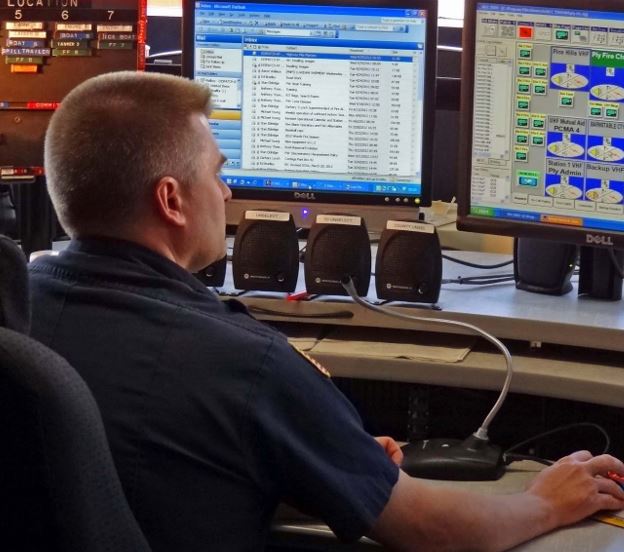Truck dispatcher training is available in many formats. Many academies offer freight dispatching courses that help beginners and intermediates learn the ropes of dispatching. It is not uncommon to operate a truck dispatching business from a home office. In fact, truck dispatchers are experts at marketing their services to small trucking companies and independent owner-operators which helps them build a strong client base. This write-up will explore the advantages of enrolling in truck dispatcher training and what an education program should include.
Components of a Successful Truck Dispatcher Training Program
A truck or freight dispatching training program should address the following skill sets and train the would-be dispatcher in effectively incorporating these competencies into their everyday work.
Acquiring and Servicing Customers
Will the dispatcher contract load from other trucking companies, brokers, or from shippers directly? Understanding how to take load board data and convert that into long-term customers who offer dedicated lanes is an invaluable skill.
Dealing with customers also means knowing how to quote rates and achieve profitability metrics such as revenue per mile. The NMFC is a leading standard in the United States of America that helps dispatchers calculate accurate freight rates, primarily when working with shippers directly. While the NMFC can seem complicated, an effective training program can help the student learn how to easily and quickly use the NMFC to quote high converting quotes to shippers.
While the above information is apart of the operational tasks assigned to the truck dispatcher, there is other, more straightforward work to perform. For example, drafting and signing agreements with brokers and shippers is paramount if you want to have a legally binding contract which outlines the business terms of service.
Furthermore, each shipper/broker has their reference numbers for each load, and this along with other relevant information must be noted on the bill of lading. Simple errors when providing customer service can lead to costly consequences.
Planning Trips and Complex Routing
Planning trips and routing drivers is another vital job duty of the dispatcher. Intermediate skills with Excel, a spreadsheet program is essential to dispatchers starting out the industry. After all, it is the most cost-effective way to track your loads.
As a dispatcher progresses through the ranks and the business starts to generate enough contribution dollars, then it will be time to upgrade to a dispatching software to coordinate a higher number of trucks and shipments. Selecting the right truck dispatch software is essential to ensuring a streamlined operation.
Moreover, dispatchers must know basic routing strategies such as the triangle. The triangle routing strategy is when a truck is directed to move loads to three cities and returns to the originating city which ultimately forms the shape of a triangle on a map. This strategy has been used by dispatchers for years and is still an effective one in maximizing profits for yourself and your drivers.
Often, you need to be a reliable source for your truck drivers. Communicating routing instructions means telling drivers to avoid roads that restrict large trucks and overpasses that do not have enough height clearance.
Managing Drivers
Dealing with drivers is just as much about interpersonal skills as it is about professional skills. Drivers need to be handed the correct shipping documents before they are dispatched. These documents must be error free. Driver must also be monitored to ensure they deliver the customers load on time and in the predetermined condition.
In emergency situations, the dispatcher must know how to coordinate a solution.
Most importantly, for each driver, the dispatcher must monitor the Hours of Service requirements compliance. For example, if Driver A only has 5 hours left on his e-Log to reach some destination 6 hours away, how will you deal with this?
It might be the case that some semi-trucks may have personalities, but you will find out that drivers do! Drivers will present requirements of their own such as scheduled time off and equipment preferences. Building a motivated group of drivers will help you avoid nuisances and maintain you and your team’s focus on servicing customers’ needs.
In circumstances that involve hazardous material shipments, arranging for the driver to receive the training required by law will often fall on your shoulders. If a driver’s training certificate expires one day before a HAZMAT load is scheduled, how will you deal with it?
Accessing and Interpreting Freight Data
If a dispatcher is working on an LTL shipment, they must also know how to consolidate shipments to maximize trailer utilization. Therefore, they must understand essential mathematical functions such as volume, area, perimeter, and weight metric conversions. Often, it is recommended students come equipped with a high school diploma or equivalent before they enroll themselves in truck dispatcher training.
The load-power balance report is a type of data that must be incorporated into every dispatching operation if success is to be achieved.
Load boards will be an excellent source of data that requires interpretation skills if you wish to make everyday use of the information on these platforms. Load boards membership fees can often be more expensive than a beginner dispatcher can afford. Therefore, some training programs provide discount offers for students who enroll in their courses. This is usually done through a partnership that has already been established between the training provider and the load board.
Type of data that needs to be assessed on a regular basis includes freight volumes, spot rates, and bench-marking.
DOT and NSC Safety Compliance
One of the most important tasks the job of a dispatcher involves is safety and compliance with policies, regulations, and laws.
Trucking since the 1900’s has been largely deregulated from an economic standpoint. However, safety regulations have impacted the trucking industry just as hard as economic regulation did.
For the dispatcher, it means that they must be able to relay safety and compliance information to their truck drivers and if applicable, management of the company.
If a carrier that the dispatcher is booking loads for operates cross-border in Canada, then the dispatcher must know the rules governed by the National Safety Code.
Mandatory drug testing in the United States is something the DOT take very seriously and is exemplified during audit time.
A good truck dispatcher training course will present laws of both countries in a complete and easy to understand way. Doing so, the dispatcher will have more understanding of the rules than most of his/her competitors do!
Interpersonal Skills for Negotiation and Communication
Interpersonal skills are those that involve things such as listening, resolving problems, speaking clearly, and effective writing. Many dispatchers fail because they do not have the interpersonal skills to succeed. A good course on freight dispatching will train you how to speak to customers, drivers, and even DOT officers.
Negotiation is both an art and a science. It may seem complicated at first, but a good training course can walk you through simple formula you can apply over and over again to reap more success and leave competitors in the dust.
What do I need to succeed in Truck Dispatcher Training?
Many people are afraid to start dispatching freight because they struggle with things such as English, Math, and using a computer. However, the good news is that you only need basic English, Math, and computer skills to become a successful dispatcher. The rest entirely depends on your work ethic and the mentor you select to train you.




Hi, My name is Alesia Guyton. First of all the break down of what I have read is very helpful to me. My husband and I are getting ready to get a business started, and this will be so very helpful to me. I really want to learn more about the lanes how to do them and most of all do it right. I want to know how to be able to dispatch others as well, keeping things in order is very important, math has never been my friend but I will be willing to learn so that I will be great help to our business and to others.
What classes do I need to research,and are they only online courses?
Can i PLEASE get information on hoq i can get a WorkBook training manual for Dispatcher. Im a hand on type of person i need to study a actual Book before taking classes
looking for traing for frieght dispatcher on truck dispatching
I want to learn truck dispactching is it on line or a place to go how much the fee is how long the classes are also is there any exams ty with bedt regards Ruby gill
How much do is cost for the class
I am interested in the dispatching training course please advise.
Hi there,
Being a dispatch, is it necessary to get the dispatch certification if you have the “Supply Chain Management” or “CIFFA” certificate?
Thank you,
Mehdi M.
I will like to take classes to be a dispatcher. what I need to do, and what is the cost
the issue with dispatchers is that they do not give enough information to the drivers. such as the warehouse number they only give an address to a place where there are 5 warehouses and they do not give a name of the company…so when a driver pulls into a location that has 5 warehouses and they only have an address and a load number who knows where they are suppose to go..not the driver most of the time the driver has little to no English skills and cant understand English very well so communicating to try to figure out where they need to go is impossible. so we lock our doors. we only do flatbed service at our warehouse so i only let those drivers in and the other are on their own to figure out where they need tog.